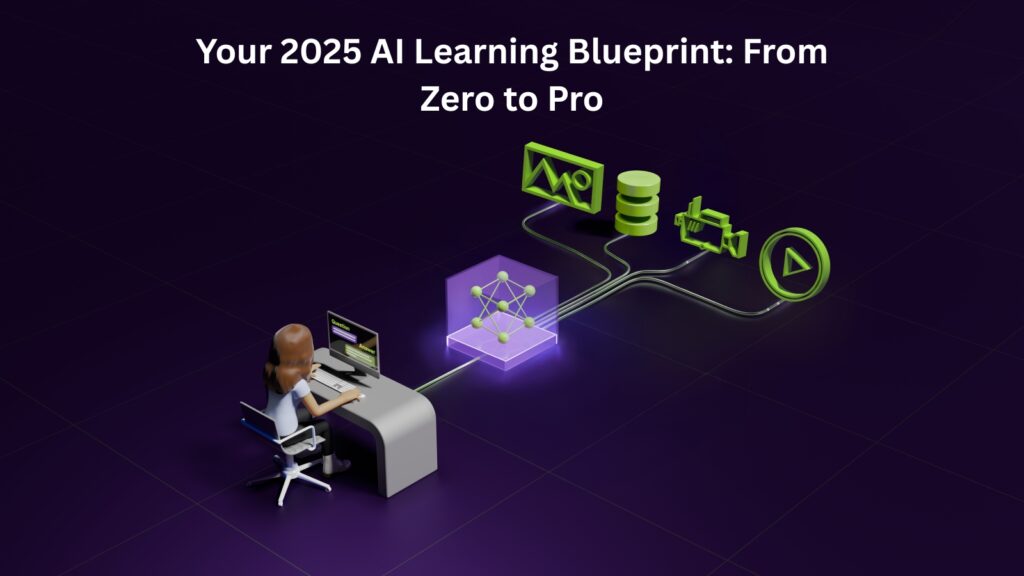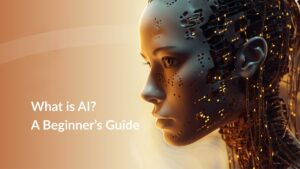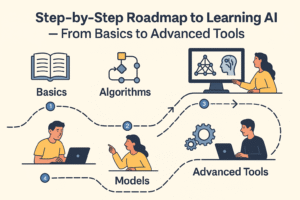
Quick Start Roadmap (TL;DR for Fast Learners)
If you want to learn AI in 2025 from zero knowledge:
- Months 0–2: Learn AI basics & no-code tools
- Months 3–5: Learn Python + machine learning basics
- Months 6–8: Dive into deep learning & generative AI
- Months 9–12: Specialize & build portfolio projects
That’s it. Now, let’s unpack this journey so it’s not just another to-do list but an actual game plan you’ll stick to.
Why This 2025 AI Learning Blueprint Works
If you’ve ever thought “I want to learn AI, but where do I start?” — you’re not alone.
This guide isn’t for AI researchers in lab coats. It’s for real people: college students balancing exams, career changers figuring out what’s next, tech pros leveling up, and entrepreneurs looking for AI-powered advantages.
Who This Is For
We designed this roadmap with different life situations in mind:
- Beginners & non-tech backgrounds – Start with no-code tools before touching code.
- Students – Build AI skills alongside your degree without burning out.
- Career changers – Transition step-by-step without leaving your job immediately.
- Tech pros – Add AI to your current skills and stay ahead of automation.
- Hobbyists – Explore AI because it’s genuinely fun and creative.
- Business owners – Use AI to save time, cut costs, and create smarter workflows.
The 12-Month AI Learning Timeline
This is your year-long playbook, broken into clear, achievable phases.
Months 0–2: Build Your AI Foundations
No pressure, no complex math — just curiosity.
- Learn the language of AI (machine learning, deep learning, generative AI).
- Play with no-code AI tools like ChatGPT, Microsoft Copilot, and Google Gemini.
- Understand basic math concepts like statistics and probability, but don’t obsess over them yet.
- Resources:
- Elements of AI (Free course)
- AI For Everyone – Andrew Ng (Coursera)
- Google AI Basics
Mini Project: Ask ChatGPT to design a personal productivity plan for you.
Months 3–5: Python + Machine Learning Basics
Now you’ll learn to “speak” AI’s favorite language: Python.
- Focus on Python fundamentals and key libraries:
pandas,numpy,matplotlib. - Understand supervised vs. unsupervised learning.
- Train small models with free datasets.
- Resources:
- Python for Everybody (Coursera, free)
- Kaggle’s Intro to Machine Learning
- Hands-On Machine Learning – Aurélien Géron
Mini Project: Train a spam email classifier.
Months 6–8: Deep Learning & Generative AI
Here’s where the magic happens.
- Learn neural networks, activation functions, and transformers.
- Explore Generative AI — from DALL·E images to GPT-based chatbots.
- Understand LLMs and RAG for smarter AI applications.
- Resources:
- Deep Learning Specialization (Coursera)
- Hugging Face tutorials
- Fast.ai free course
Mini Project: Build a chatbot that answers questions using your own documents.
Months 9–12: Specialization + Portfolio
By now, you’re no longer “just starting out.”
- Pick a niche: computer vision, NLP, AI in business, or data science.
- Create 3 portfolio projects — post them on GitHub and LinkedIn.
- Enter AI hackathons to challenge yourself.
- Resources:
- OpenAI Cookbook
- TensorFlow/PyTorch official docs
- Kaggle Competitions
Mini Project: AI dashboard for real-time business analytics.
Essential Resources by Stage
- Foundations: Elements of AI, AI For Everyone, Microsoft Learn AI.
- Coding & ML: Kaggle, Python Crash Course, Hands-On Machine Learning.
- Advanced AI: Hugging Face, Fast.ai, DeepLearning.AI.
- Portfolio: GitHub, Streamlit, AI hackathons.
Mindset Matters
AI isn’t a subject you “finish” — it’s a skill you grow.
DeepMind’s Demis Hassabis says beginners should “train like AI ninjas” — experiment daily, build small projects, and push boundaries. Your journey should be as playful as it is productive.
FAQs
Q: How long does it take to learn AI from scratch?
A: Most beginners see solid results in 6–12 months with consistent practice.
Q: Do I need coding skills to start AI?
A: Not at first. You can begin with no-code tools and transition to coding later.
Q: Which should I learn first: ML or deep learning?
A: Start with ML basics, then move into deep learning.
Q: What’s the easiest beginner AI project?
A: Sentiment analysis of tweets or a basic chatbot.
Q: How do I stay motivated?
A: Join AI forums, share projects publicly, and track your wins.


